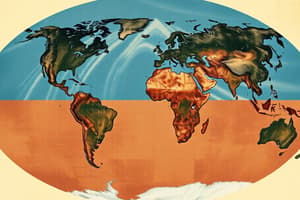Podcast
Questions and Answers
What was a major criticism of Alfred Wegener's hypothesis of Continental Drift?
What was a major criticism of Alfred Wegener's hypothesis of Continental Drift?
- The continents did not match in size.
- He lacked a mechanism for drift. (correct)
- His theory contradicted the theory of evolution.
- He had insufficient fossil evidence.
Which piece of evidence did Wegener NOT use to support his hypothesis of Continental Drift?
Which piece of evidence did Wegener NOT use to support his hypothesis of Continental Drift?
- The distribution of volcanic activity. (correct)
- Paleoclimatic evidence.
- The fossil record of land-dwelling creatures.
- Matching rock types and structural similarities.
How did the idea of Continental Drift gain credibility after Wegener's time?
How did the idea of Continental Drift gain credibility after Wegener's time?
- Due to extensive geological surveys.
- By the development of plate tectonics theory. (correct)
- Through the discovery of continental fossils.
- From new climate change models.
What was the hypothesized supercontinent proposed by Wegener called?
What was the hypothesized supercontinent proposed by Wegener called?
Which type of evidence involved the discovery of similar geologic structures on different continents?
Which type of evidence involved the discovery of similar geologic structures on different continents?
Flashcards are hidden until you start studying
Study Notes
Continental Drift
- The theory that continents are movable.
- Proposed by Alfred Wegener, a German meteorologist.
- Based on the idea of Pangaea - a supercontinent that existed in the past.
- Supported by evidence like the "fit" of continents, locations of ancient glaciations, fossil evidence, similarities in rock types and structures, and paleoclimatic evidence.
Wegener's Theory: Reception and Revival
- Wegener's theory was met with debate and skepticism.
- Many scientists disregarded his ideas due to lack of a mechanism explaining continental drift.
- Wegener died at a young age, and his theory faded due to absence of a strong advocate.
- The theory was revived in the 1950s.
Evidence Supporting Continental Drift
-
Continental "Fit": Wegener noted the shape of continents suggests they could fit together. He asserted that this fit is not coincidental. The fit is better when considering the edges of the continental shelves, rather than present-day shorelines
-
Glacial Evidence: Permian glacial till (sediment deposited by glaciers) is found on four different continents. Notably, this till is present in Africa and India, which are now near the equator. This suggests a different climate in the past, and not just a cooler Earth as tropical plants are also found in the same area.
-
Paleoclimatic Evidence: Placing Pangaea over the Permian South Pole allowed Wegener to correctly predict the existence of tropical coals, tropical reefs, subtropical deserts, and subtropical evaporates in specific regions.
-
Fossil Evidence: Identical fossils are found on continents now separated by oceans. These organisms would have been unable to cross vast oceans.
-
Matching Geology: Geologic features match across the Atlantic Ocean, indicating a similar past. These features include:
- Geologic structures
- Rock types
- Rock ages
- Continuity of mountain ranges.
Continental Drift: Modern Understanding
- The theory is now scientifically accepted, with evidence from sea-floor spreading, subduction, and plate tectonics supporting its validity.
- Wegener's observations were accurate and foundational for the modern understanding of Earth dynamics.
Studying That Suits You
Use AI to generate personalized quizzes and flashcards to suit your learning preferences.



